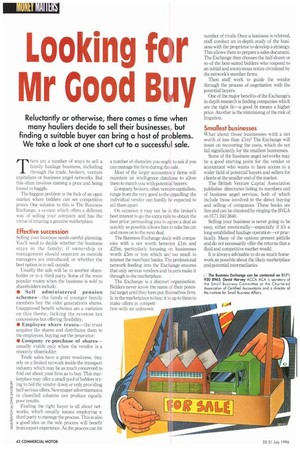Looking for Mr Good Buy
Page 46

If you've noticed an error in this article please click here to report it so we can fix it.
There are a number of ways to sell a family haulage business, including through the trade, brokers, venture capitalists or business angel networks. But this often involves naming a price and being forced to haggle.
The biggest problem is the lack of an open market where bidders can set competitive prices. One solution to this is The Business Exchange, a system which offers a different way of selling your company and has the virtue of creating a genuine marketplace.
Selling your business needs careful planning. You'll need to decide whether the business stays in the family; if ownership or management should separate as outside managers are introduced; or whether the best option is to sell outside.
Usually the sale will be to another shareholder or to a third party. Some of the more popular routes when the business is sold to shareholders include:
• Self administered pension schemes—the funds of younger family members buy the older generation's shares. Unapproved benefit schemes are a variation on this theme, lacking the revenue tax concessions but offering flexibility; • Employee share trusts—the trust acquires the shares and distributes them to the employees, buying out the proprietor; • Company re-purchase of shares— usually viable only when the vendor is a minority shareholder.
Trade sales have a great weakness: they rely on a limited network inside the transport industry which may be as much concerned to find out about your firm as to buy. This marketplace may offer a small pool of bidders trying to bid the vendor down or only providing half-serious offers. Newspaper advertisements in classified columns can produce equally poor results.
Finding the right buyer is all about networks, which usually means employing a third party to manage the process. This is also a good idea as the sale process will benefit from expert experience. As the process can hit a number of obstacles you ought to ask if you can manage the firm during the sale.
Most of the larger accountancy firms will maintain an intelligence database to allow them to match you with potential buyers.
Company brokers, often venture capitalists, range from the very good to the appalling; the individual vendor can hardly be expected to tell them apart.
On occasion it may not be in the broker's best interest to go the extra mile to obtain the best price: persuading you to agree a deal as quickly as possible allows him to take his cut and move on to the next deal.
The Business Exchange deals with companies with a net worth between Lim and £25m, particularly focusing on businesses worth £5m or less which are too small to interest the merchant banks. The professional network feeding into the Exchange ensures that only serious vendors and buyers make it through to the marketplace.
The Exchange is a discreet organisation. Bidders never know the name of their potential target until they have put themselves firmly in the marketplace to buy; it is up to them to make offers in competition with an unknown number of rivals. Once a business is referred, staff conduct an in-depth study of the business with the proprietor to develop a strategy. This allows them to prepare a sales document. The Exchange then chooses the half-dozen or so of the best-suited bidders who respond to an initial and anonymous notice circulated by the network's member firms.
Then staff work to guide the vendor through the process of negotiation with the potential buyers.
One of the major benefits of the Exchange's in-depth research is finding companies which are the right fit—a good fit means a higher price. Another is the minimising of the risk of litigation.
What about those businesses with a net worth of less than Lim? The Exchange will insist on recovering the costs, which do not fall significantly for the smallest businesses.
Some of the business angel networks may be a good starting point for the vendor or accountant who wants to have access to a wider field of potential buyers and sellers for clients at the smaller end of the market.
The British Venture Capital Association publishes directories listing its members and of business angel services, both of which include those involved in the direct buying and selling of companies. These books are free and can be obtained by ringing the BVCA on 0171 240 3846.
Selling your business is never going to be easy, either emotionally—especially if it's a long-established haulage operation—or practically. Many of the options present pitfalls and do not necessarily offer the returns that a fluid and competitive market would.
It is always advisable to do as much homework as possible about the likely marketplace and potential intermediaries.












































































































